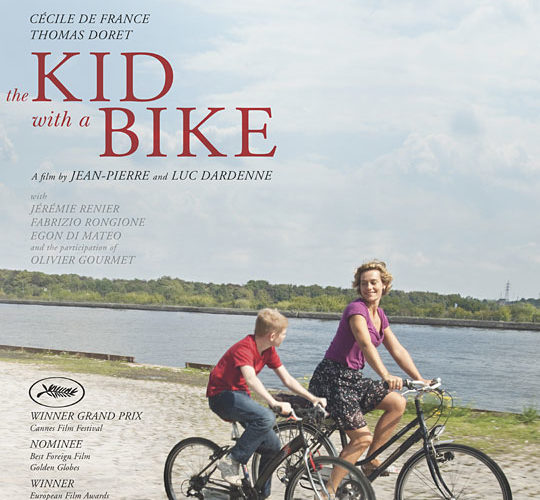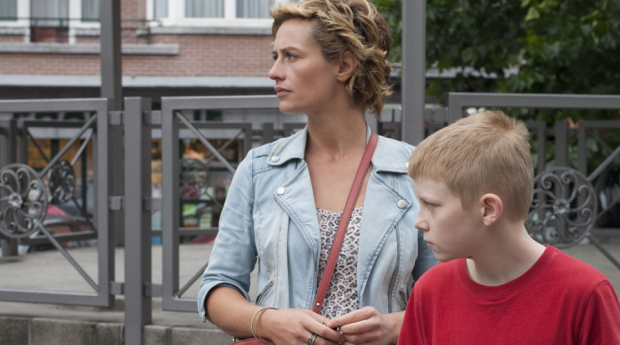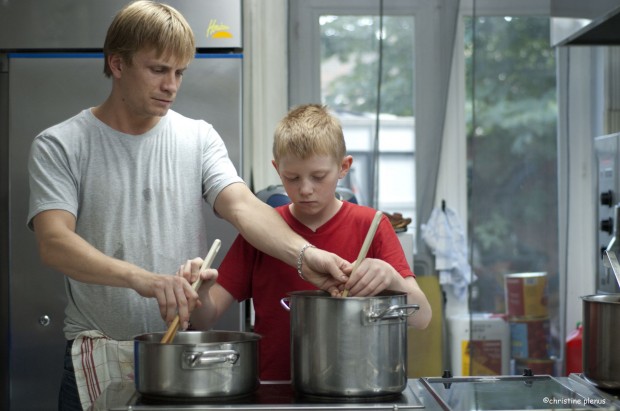Reality is a pretty easy thing to portray in a movie. We all have a pretty firm grip on the rules of the world, and the way that certain events will play out once initiated. To mirror reality is merely a matter of viewing and reproducing. However, authenticity is a much different beast to tame. To make a movie feel authentic, like a swatch of fabric freshly hewed from the tapestry of life, is a feat that is rarely achieved in full.
Part of this is because the grammar of cinema is made to accentuate the artifice of the narrative method. Cuts and varying focal lengths and non-diegetic music all work to put a facade of unreality over the approximation of reality that the artists work so hard to create. Part of it is just the fact that we, the audience, can see the seams at the edges, sense the performance, feel the auteur behind the camera.
With The Kid With a Bike, the Dardenne brothers, Luc and Jean-Pierre, somehow manage to eliminate these seams, to create a motion picture of such remarkable authenticity and power that the illusion of cinema never overshadows the magic of the film.
The story is simple, deceptively so, and we are introduced to it with economy and grace. Cyril (Thomas Doret) is a young boy in a youth boarding home. His father brought him to the estate a while ago with promises to return, but as time has gone on the probability of that happy outcome has dwindled. The phone in his father’s apartment is no longer working, and the super is saying that he has moved out. Cyril persists in his belief in his father, though, especially with regards to the fate of his prized bike. In his attempt to find his father and his bike, Cyril finds Samantha (Cécile De France), a hairdresser that agrees to take him in during weekends.
Their relationship is one that is fraught from the start, as Cyril has begun a slow regression into distrust and anger. It is these two performances that anchor the film, and thanks to the masterful, organic nature of their individual performances and their relationship, they make the film sing. Doret, young as he is, strikes notes here that many older actors would struggle with. There is a pain behind him, but he masks it in the righteous indignation and stolid sense of rightness of a child. The solutions to his unhappiness seems so clear to him, and the roadblocks seem so easily surmounted, that he can’t help but rebel against the idea of them in startling ways. De France, meanwhile, makes the ineffable well of kindness in her character seem as natural as life itself. She endures and accepts so much, but always the toll is clear in her eyes and her demeanor, if not her actions and words.
The Dardennes themselves are not what one would conventionally expect to be called great directors. We expect our best auteurs to have tricks, hallmarks and signatures. Instead, the Dardennes have a sense of calm, solid truth. They use long takes in a way that shows an understanding of the way people interact, and undercuts any sense of artifice that may threaten to accumulate. Michael Bay has low-angle revolving camera work, Steven Spielberg has the “Spielberg look,” and the Dardennes have naked, unfettered truth.They are truly artists of great craft and expert precision.
As much as The Kid With a Bike is an intense and personal drama, it also could function as a thriller of sorts. In seeing Cyril’s situation and the way his emotions, so far beyond the comprehension of a young boy, mount and compound on themselves, there is a sense of growing dread. It feels as though his soul, his life, his future all hang in the balance, to be decided by the adults around him who exert their influence on him either actively or in passing.
This tension – and all the hope and worry and dread it engenders in the viewer – cultivated alongside the stark, staggering authenticity of this tale, make The Kid With a Bike a film not to be missed and impossible to be forgotten.
The Kid With a Bike is now in limited release.



